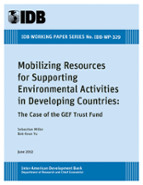Mobilizing Resources for Supporting Environmental Activities in Developing Countries: The Case of the GEF Trust Fund
Date
Jun 2012
Mobilizing sufficient resources is essential for supporting environmental activities in developing countries, and cofinancing is generally considered an important tool to help developing countries increase the resources they need. Moreover, cofinancing should increase ownership of projects by local authorities while improving accountability. The literature, however, has not explored why certain projects receive higher levels of cofinancing than others. This paper attempts to fill this gap by examining the cofinancing ratio and its determinants using projects financed by the GEF Trust Fund. The empirical results confirm that the rules of the fund, requiring different minimum cofinancing ratios by size and focal area of the GEF projects, do matter. Other important factors include funds' origins (foreign vs. domestic), types of cofinancing sources (reimbursable vs. nonreimbursable) and the particular GEF agencies involved.



